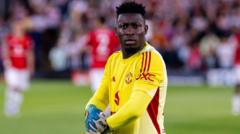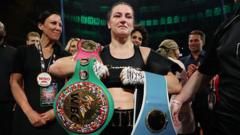Is Ryan Routh’s Trial for Attempted Trump Assassination Starting with a Judge's Interruption?

Published: 2025-09-11 18:09:03 | Category: world
This article covers the trial of Ryan Routh, who is accused of attempting to assassinate Donald Trump. During his opening remarks, Routh was interrupted by the judge for straying off topic. The prosecution intends to present substantial evidence, including cellphone data, security footage, and eyewitness accounts, to prove their case. Routh faces multiple charges and has pleaded not guilty.
Last updated: 19 October 2023 (BST)
Key Takeaways
- Ryan Routh is defending himself in a high-profile trial regarding the attempted assassination of Donald Trump.
- Judge Aileen Cannon repeatedly instructed Routh to focus on the case during his opening remarks.
- The prosecution plans to present significant evidence, including a weapon and eyewitness testimony.
- Routh is charged with five crimes and has pleaded not guilty.
- The jury consists of 12 members, with a mix of genders and four alternates.
Overview of the Case
The trial of Ryan Routh began with considerable media attention due to the serious nature of the charges. Routh is accused of attempting to assassinate Donald Trump during the election campaign for the 2024 presidential race. The implications of this case stretch beyond Routh himself, touching on broader issues of political safety and public confidence in the electoral process.
Initial Proceedings
During the initial moments of the trial, Routh attempted to provide a philosophical perspective on human existence, which was quickly cut short by Judge Aileen Cannon. She emphasized the need for Routh to keep his remarks relevant to the case at hand. This exchange set a tone for the trial, indicating the judge's intent to maintain order and focus during the proceedings.
Prosecution's Opening Statement
In sharp contrast to Routh's disjointed opening, the prosecution, led by attorney John Shipley Jr, delivered a focused and powerful opening statement. Shipley asserted that Routh's actions represented a deliberate attempt to deny the American people their choice in the upcoming election. He outlined the prosecution's case, which is built on various pieces of evidence, including:
- Cellphone data tracking Routh's movements.
- Security footage capturing the events leading to the incident.
- A handwritten note expressing Routh's intention to kill Trump.
- Eyewitness testimony, including that of a US Secret Service agent.
Evidence Presented
The prosecution's case relies heavily on concrete evidence. One of the key witnesses, US Secret Service agent Robert Fercano, testified about his encounter with Routh at Trump's West Palm Beach golf course. Fercano described finding Routh hiding near a fence, armed with what appeared to be a weapon. This testimony is crucial, as it establishes Routh's presence and potential threat at the scene.
Witness Testimony
Fercano recounted his actions during the confrontation, noting that he saw Routh's face and the muzzle of a firearm pointed at him. This alarming revelation underscores the gravity of the situation and the immediate danger posed by Routh. The jury heard audio recordings of Fercano's radio communication during the incident, which included urgent reports of "Shots fired!" This high-stakes moment is pivotal in illustrating Routh's alleged intent and the response from law enforcement.
Routh's Defence Strategy
Throughout the trial, Routh is representing himself, which is a risky strategy in such a complex legal situation. His self-representation may affect how effectively he can counter the prosecution's claims. In a recent exchange, Routh questioned Fercano about the positioning of the weapon during their encounter, which could be an attempt to undermine the credibility of the witness's testimony. However, Routh's questioning style and the overall effectiveness of his defence remain to be seen as the trial progresses.
Charges Against Routh
Routh faces five charges, including the attempted assassination of a major presidential candidate and several firearms-related offences. The severity of these charges highlights the potential consequences he faces, which could include significant prison time if found guilty. Routh has pleaded not guilty, indicating that he will contest the evidence and the prosecution's narrative.
The Jury Composition
The jury selected for this trial consists of 12 members, including seven women and five men, alongside four alternates. The selection process took three days, during which Routh attempted to dismiss jurors with ties to law enforcement, arguing that their backgrounds could bias their judgement. However, Judge Cannon determined that Routh's reasons for dismissal were not valid, and the jury remains intact.
Legal Implications and Next Steps
The trial's outcome could have significant repercussions, not just for Routh but also for the broader political landscape in the United States. A conviction could potentially lead to a reevaluation of security measures surrounding political figures, especially during election campaigns. As the trial continues, the presentation of evidence and witness testimonies will be critical in shaping the jury's perception of Routh's guilt or innocence.
What Happens Next?
As the trial unfolds, both the prosecution and the defence will present their cases, with the jury tasked with determining Routh's fate. The next stages will involve further witness testimonies, the presentation of evidence, and potentially closing arguments. The timeline for the trial remains uncertain, but it is expected to draw considerable public and media interest given the high-profile nature of the case.
In summary, the trial of Ryan Routh is a complex legal battle that raises important questions about political safety and the responsibility of individuals in a democratic society. As the case progresses, it will be crucial to observe how the evidence is interpreted and the implications of the jury's verdict on the national stage. What do you think this case reveals about the current political climate in the United States? #RyanRouth #TrumpAssassinationAttempt #USJudicialSystem
FAQs
What charges is Ryan Routh facing?
Ryan Routh is facing five charges, including the attempted assassination of a major presidential candidate and firearms-related offences. He has pleaded not guilty to these charges.
Who is the judge presiding over the case?
The judge presiding over the trial is Judge Aileen Cannon, who has been responsible for maintaining order and focus during the proceedings.
What evidence is being presented against Routh?
The prosecution is presenting several pieces of evidence, including cellphone data, security footage, a handwritten note by Routh, and eyewitness testimony from law enforcement officials.
How is Routh defending himself?
Ryan Routh is representing himself in court, which involves questioning witnesses and presenting his perspective on the events. This approach carries inherent risks in a complex legal setting.
What implications could this trial have?
The trial's outcome could influence security measures for political figures and public perception of safety during election campaigns, highlighting the serious nature of the charges against Routh.



